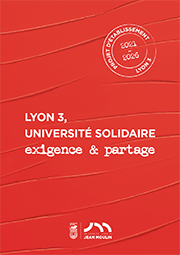AccueilRechercheProgrammes et productions scientifiquesThèsesThèses soutenuesThèses soutenues - 2006-2021Thèses soutenues - 2012
-
Partager cette page
- Recherche,
VIANES Emmanuel
Entre guerre et Paix : les Administrations Internationales Post-Belligérantes
Publié le 4 janvier 2013 – Mis à jour le 4 janvier 2013
Thèse en Science politique soutenue le 19 novembre 2012
La notion d’administration internationale post-belligérante est spécifique au sein des administrations de territoire en relations internationales, au c?té des opérations de paix. Lors de situations exceptionnelles, une Autorité internationale est instaurée lors de périodes transitoires, qui oscillent entre la guerre et la paix, pour remédier à des différends territoriaux et/ou à des problèmes de gouvernance. Cette institution politique repose sur le fait qu’un acteur international est responsable de l’administration d’un territoire de manière temporaire dans une situation de post-belligérance, qu’il exerce sa fonction dans l’intérêt de la population et de la société internationale, qu’il superpose les ordres juridiques international et interne, qu’il établit des structures de gouvernance mixtes et qu’il peut intervenir dans les relations internationales au nom du territoire administré. Pour élaborer une réflexion sur ce concept, il faut faire le lien entre le droit international public et les relations internationales afin de disséquer ? l’idée ? et d’établir ainsi une grille de lecture. Dans la pratique, l’expérimentation en matière d’administration internationale post-belligérante se divise entre la phase plénière, le partenariat et l’appropriation locale du processus afin d’entrevoir la finalité de ce mécanisme : la construction d’une passerelle entre la prégnance de l’étatisme au sein du système international et la diffusion des normes de la société internationale. Ceci est révélé à la lumière des expériences de la Bosnie-Herzégovine, du Kosovo et du Timor oriental.
Beside peace operations, the concept of international post-belligerent (post-conflict) administration is a particular form of territorial administration in international relations. In exceptional situations, an international Authority is set up during transitional periods that fluctuate between war and peace to settle territorial disputes and/or problems of governance. The basis of this type of political institution is that an international actor has responsibility for the temporary administration of a territory in a post-belligerent situation, that it discharges that function in the interest of the population and of international society, that it juxtaposes the international and internal legal orders, that it establishes joint governance structures and that it can act in international relations on behalf of the territory it administers. Studying this concept entails establishing the connection between public international law and international relations so that one can dissect the “idea” and determine an approach. In practice, experimentation in the realm of international post-belligerent (post-conflict) administration comprises a plenary phase, partnership and local ownership of the process and has as its end-purpose the building of a bridge between the impact of statism in the international system and the propagation of the norms of international society. This is demonstrated in the light of the developments in Bosnia and Herzegovina, Kosovo and East Timor.
Mots-clés : administration internationale de territoire ; jus post bellum ; souveraineté ; gouvernance ; post-conflit ; organisations internationales ; institutions internationales ; gouvernance mondiale ; droit international public ; relations internationales.
Key words : international territorial administration; jus post bellum; sovereignty; governance; post-conflict; international organizations; international institutions; global governance; public international law; international relations.
Directeur de thèse : Jean-Paul JOUBERT
Membres du jury :
DARIO BATTISTELLA, Professeur à l’Institut d’études politiques de Bordeaux
ROBERTO GARRETON, Avocat spécialiste des droits de l'homme
ALBANE GESLIN, Professeur à l’Institut d’études politiques de Lyon
FR?D?RIC RAMEL, Professeur à l’Institut d’études politiques de Paris
Président du jury : Albane GESLIN
Mention : Très honorable avec les félicitations du jury
Equipe d'accueil : CLESID
Beside peace operations, the concept of international post-belligerent (post-conflict) administration is a particular form of territorial administration in international relations. In exceptional situations, an international Authority is set up during transitional periods that fluctuate between war and peace to settle territorial disputes and/or problems of governance. The basis of this type of political institution is that an international actor has responsibility for the temporary administration of a territory in a post-belligerent situation, that it discharges that function in the interest of the population and of international society, that it juxtaposes the international and internal legal orders, that it establishes joint governance structures and that it can act in international relations on behalf of the territory it administers. Studying this concept entails establishing the connection between public international law and international relations so that one can dissect the “idea” and determine an approach. In practice, experimentation in the realm of international post-belligerent (post-conflict) administration comprises a plenary phase, partnership and local ownership of the process and has as its end-purpose the building of a bridge between the impact of statism in the international system and the propagation of the norms of international society. This is demonstrated in the light of the developments in Bosnia and Herzegovina, Kosovo and East Timor.
Mots-clés : administration internationale de territoire ; jus post bellum ; souveraineté ; gouvernance ; post-conflit ; organisations internationales ; institutions internationales ; gouvernance mondiale ; droit international public ; relations internationales.
Key words : international territorial administration; jus post bellum; sovereignty; governance; post-conflict; international organizations; international institutions; global governance; public international law; international relations.
Directeur de thèse : Jean-Paul JOUBERT
Membres du jury :
DARIO BATTISTELLA, Professeur à l’Institut d’études politiques de Bordeaux
ROBERTO GARRETON, Avocat spécialiste des droits de l'homme
ALBANE GESLIN, Professeur à l’Institut d’études politiques de Lyon
J
EAN-PAUL JOUBERT, Professeur à l’Université Jean Moulin – Lyon 3FR?D?RIC RAMEL, Professeur à l’Institut d’études politiques de Paris
Président du jury : Albane GESLIN
Mention : Très honorable avec les félicitations du jury
Equipe d'accueil : CLESID
Documentation
Mise à jour : 4 janvier 2013







